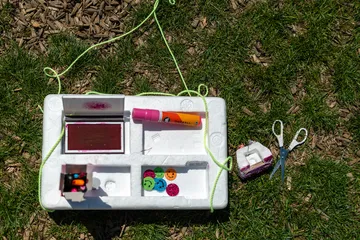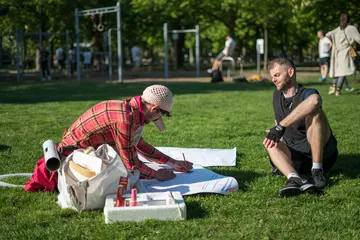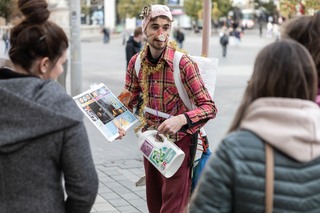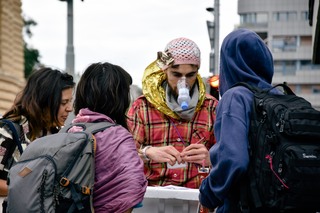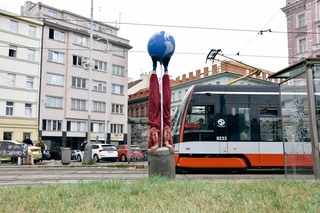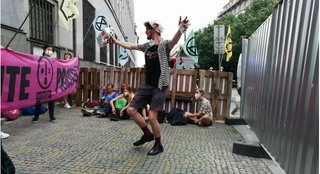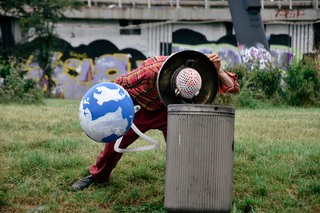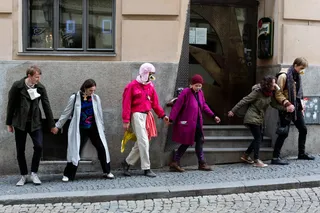Atlas
Genus: Homo deus
Gender: *
Height: 178 cm
Weight: ca 63 kg
Genealogy: grandson of Gaia (Earth) and Uranus (Sky) and great-grandson of Chaos
Enviroment: usually lives near trash cans or among trees
Scientific name: klaunos aktivistum

Atlas is a subversive chameleon. They are a multipolar clown with a thousand noses. They have a huge need for communication and contact with other people, with whom they look for opportunities for uncontrolled dialogue. But Atlas is also just Atlas, a lost myth looking for a replacement. They are a dawdling clown looking for meaning in this clogged-up world.
Everything, what Atlas has found, is gathered in Atla’s procrabstination folders.
The Atlas project is a several-day intervention in the public space consisting of various encounters with Atlas the clown: open office hours, guided walks and a final performative ritual that bears traces of all previous meetings (see description below). The length of the clown-activist Atlas's intervention in public space is flexible and adapts to individual spaces and contexts.
Author, performer: Florent Golfier-Brechmann
Co-authors, dramaturgs: Laura Golfier-Brechmann, Ondřej Holba
Production: tYhle, Ludmila Šindlerová
Partners of the project: Studio ALTA, Rezi.dance Komařice, Moving Station Plzeň, Terén
Acknowledgements: Lukáš Karásek, Jana Vaverková, the members of Místní místním (Locals for locals) organisation – Filip, Eva and Jirka.
The premiere of the Atlas project took place in the streets of Brno from 12th to 15th October 2021.
Open office hours
During Open office hours, Atlas welcomes passers-by in their improvised office by the trash can and invites them to dialogue, play or draw on ecological and social topics.
The length of opening hours is variable.
Guided walks
Atlas the clown leads a site-specific walk through the city, during which visitors learn more about clown activism. They discover how to befriend pigeons, trees and other creatures, how to carry out a gravity strike, and how the concepts of clownocracy and social polystyrene could become tools for the systemic change that the world so desperately needs.
The duration of one guided walk is approx. 60 minutes.
Final performative ritual
Atlas the Clown celebrates all the meetings of the last few days and all the inspiration that arose during them. The ritual aims at a collective awareness of the anthropocentrism and individualism of our culture and motivates the participants to social transformation.
The duration of the ritual is approx. 40 minutes.
Other variants of the project:
Atlas – mobile office
If you want, Atlas will come with its polystyrene office directly to you. They are interested in what you are doing, what you are dealing with and what you want to change. They will be happy to show you their family album, introduce you to their friends and relatives, or introduce you to their concept of social polystyrene. With a bit of luck, you can even play together or create a new way of gravity strike. Do not hesitate to reach out to him on atlasatlas@posteo.net.
Clown-Activist Workshop
The workshop straddles activism, intervention and (clown) performance. It offers a varied set of performative and activist exercises, with the help of which participants can find their own way to clowning. The motto is "Your clown is as individual as you are", so there are no limits except your own imagination. The workshop is open to all interested groups, previous experience is not necessary. Workshops can be conducted in Czech, English or French according to the needs of the participants.
Nose Assembly for Tomorrowˇ
Atlas project is followed by the N.A.Toˇ – Nose Assembly for Tomorrowˇ project. It is an international network where activists, clowns and performers meet and share their experiences in creating surprising, entertaining and disobedient forms of civic activism. In addition to workshops, lectures and discussions, clown performances and happenings take place within and in connection with the N.A.Toˇ.
Support
The project was created in 2021 with the financial support of the Ministry of Culture of the Czech Republic, the City of Prague, the Brno City Hall and the State Culture Fund.
In 2024, the project was implemented with the financial participation of the EU through the National Recovery Plan as part of the tYhle on the road project.




